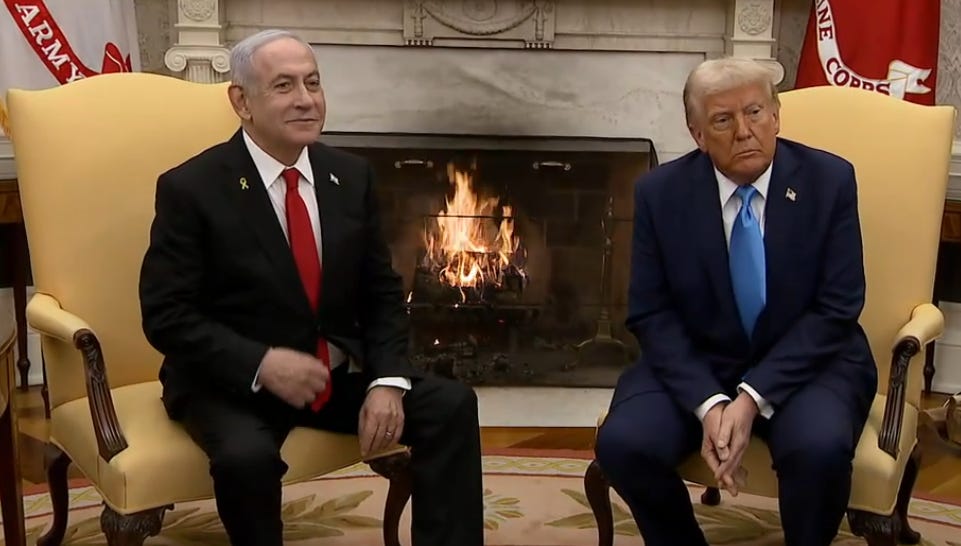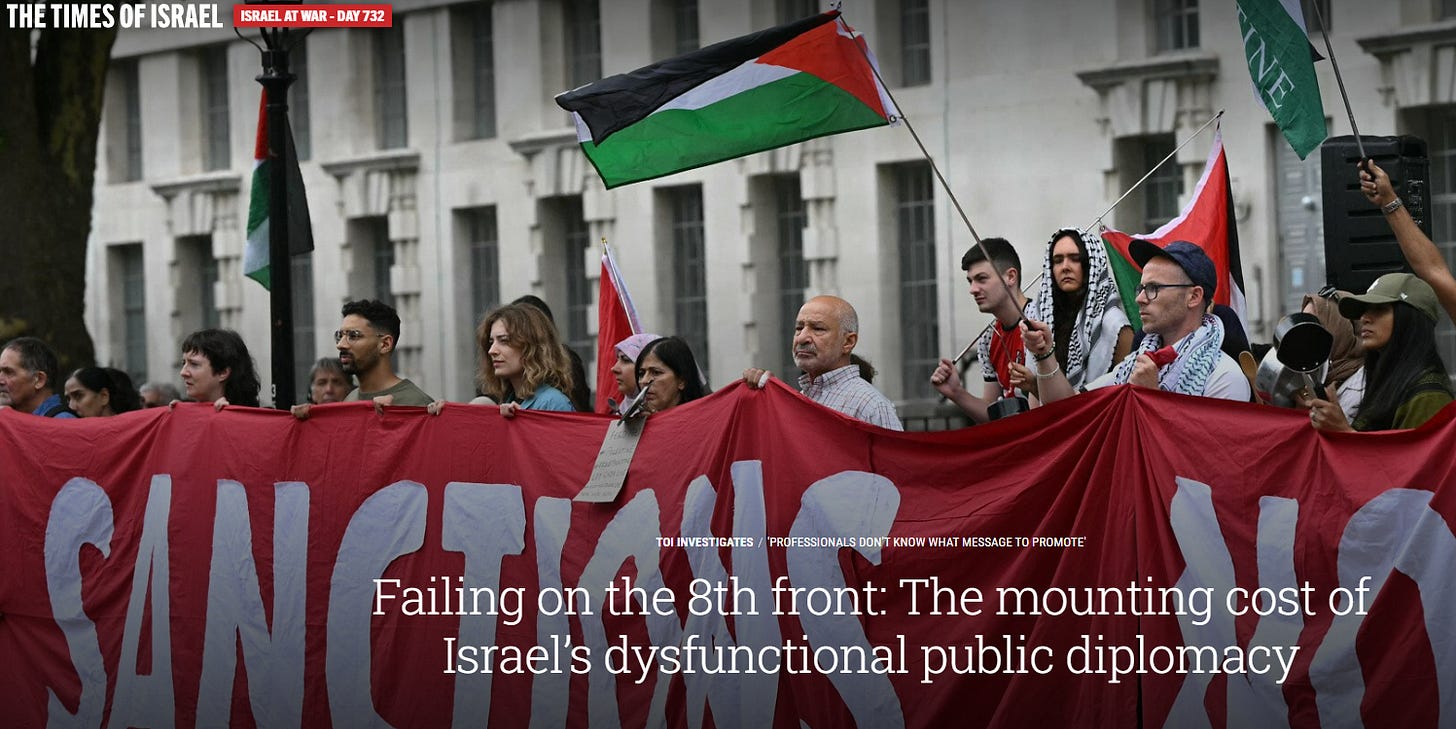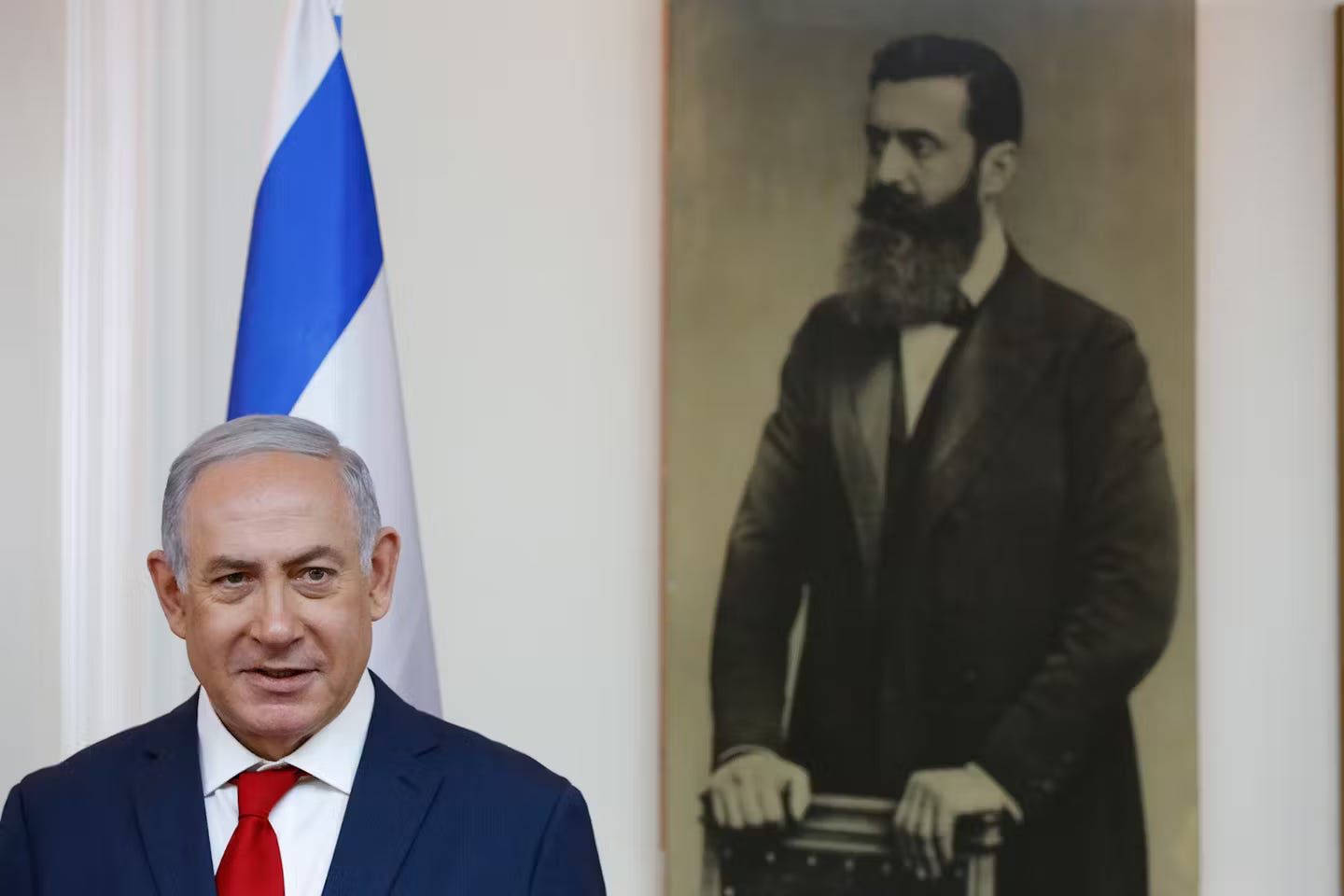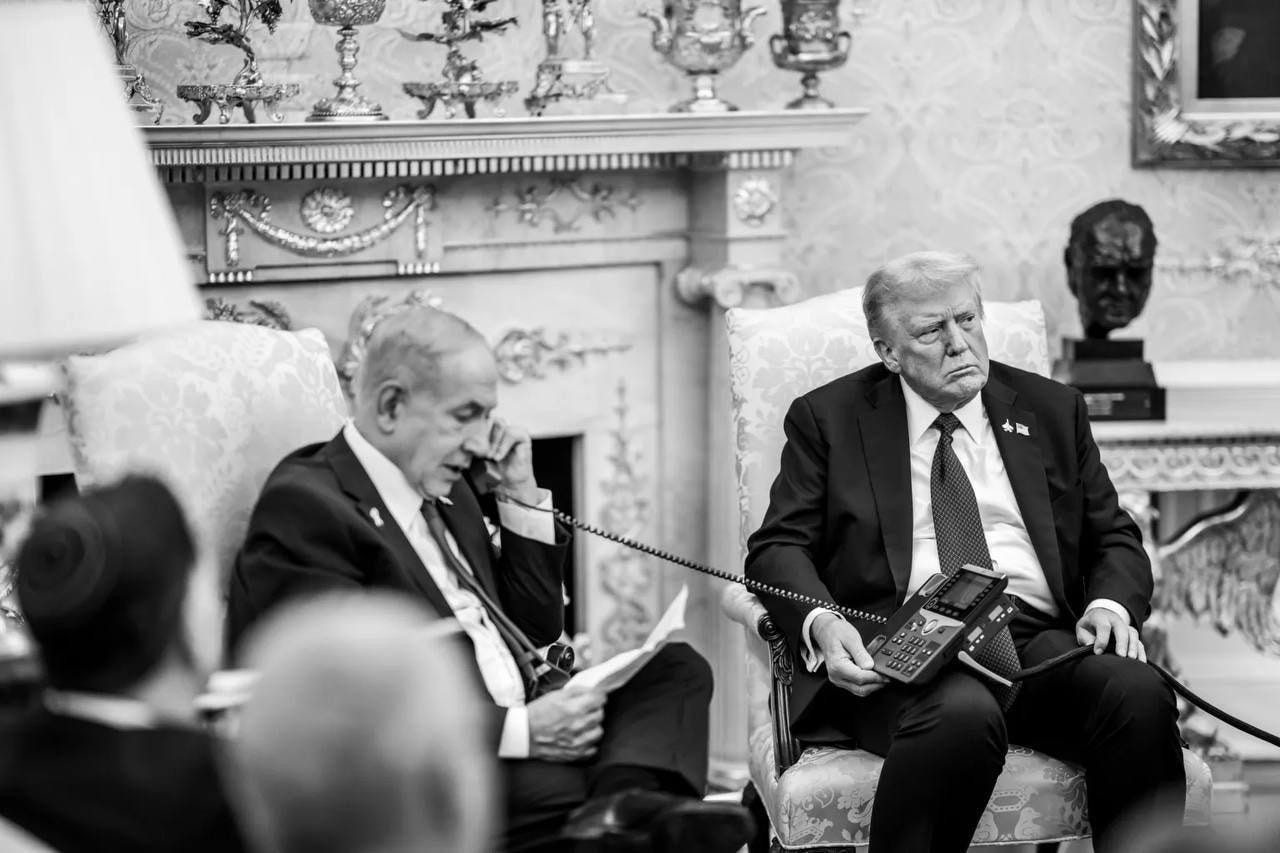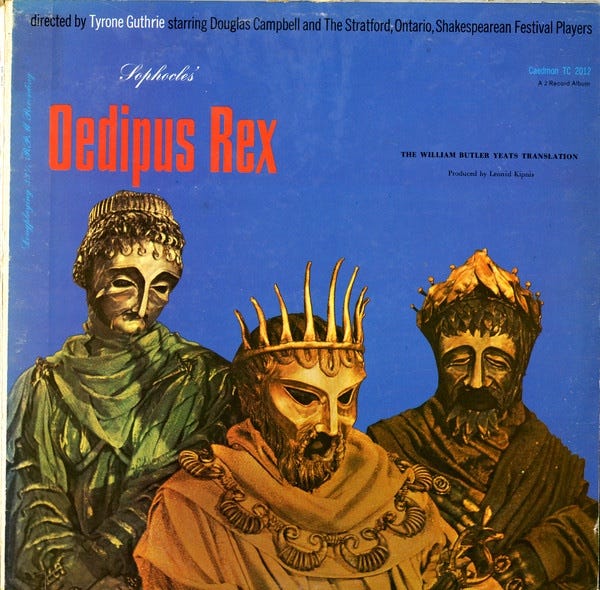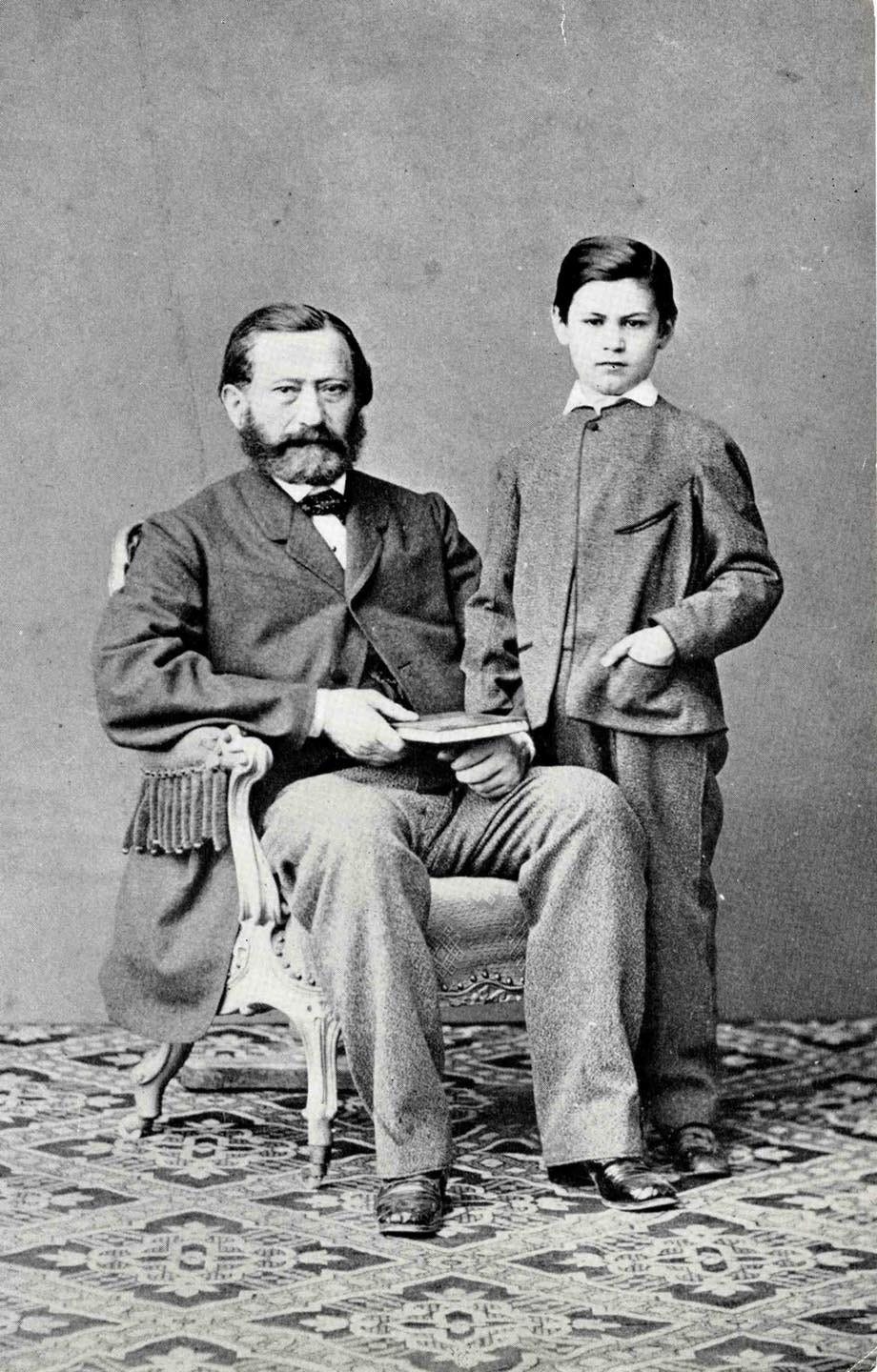Mommy Issues
A mythological and psychoanalytic study of the debauched US-Israel couple, where US paternal authority has collapsed into a child-mother orgy of desire, spawning a feral patricidal rage on the right.
Even as a ceasefire in Gaza seems to take root, it feels less like the end of a war than a strategic timeout—a pause on one stage to prepare for a larger tragedy elsewhere. Prime Minister Benjamin Netanyahu has already begun redirecting Washington’s gaze toward Iran, warning that Tehran’s missiles may soon reach the American mainland. Any hesitation among American influencers to sell a US strike on Iran could imperil his grand designs.
As the geopolitical stakes rise, the tempo of Israel’s information warfare must quicken—what Israeli analysts themselves call the “Eighth Front.” Netanyahu has personally stepped into the fray, granting interviews to rigidly orthodox pro-Israel figures like Ben Shapiro and Dinesh D’Souza. This direct intervention responds to a shocking shift within the American right: prominent voices, while not yet totally abandoning Israel, have begun to question the dogma of unconditional fealty. Figures such as Tucker Carlson, Megyn Kelly, Candace Owens, and, in his final weeks, Charlie Kirk, have all signalled varying degrees of disillusionment with the Jewish state and its dogmas. To a person, they oppose the idea of American boys dying in Iran.
If sentiment toward Israel lies on a spectrum from ten (unabashed devotion) to zero (tenacious hostility), these conservative voices have slipped from ten’s to seven’s or six’s. From an American vantage point, they remains staunchly pro-Israel. But from Israel’s perspective, anything short of a perfect ten looks suspect. In wartime, ambiguity reads as betrayal—especially in a conflict where tens of thousands of children are being killed.
And so, as the drums of war against Iran beat louder, Israel needs the heavy artillery of influencer tens—the perfect dimes, not the mediocre mids—to drag America into yet another Middle Eastern war.
Déjà Vu—Israel’s Civilizational Mission
It was in this context that Netanyahu, during his interview with Shapiro, offered a familiar refrain about Israel’s historic mission to Western civilization:
“We are fighting the battle of the free world—the battle to prevent the barbarians from conquering the Middle East, storming into Europe, and then attacking the United States. I’m very proud of our soldiers, who in defending ourselves so courageously, are also defending all of free civilization.”
The grandiosity of the claim is unmistakable. For a small nation dependent on the maternal generosity of the United States, to posture as the saviour of “free civilization” carries the unmistakable stench of narcissism. Yet Netanyahu’s rhetoric is not new. It echoes almost verbatim the vision articulated by Theodor Herzl in Der Judenstaat more than a century earlier:
“Palestine is our ever-memorable historic home… We should there form a portion of a rampart of Europe against Asia, an outpost of civilization as opposed to barbarism. We should as a neutral State remain in contact with all Europe, which would have to guarantee our existence.”
Herzl’s vision arose from the trauma of failed Jewish emancipation in Europe. The Dreyfus Affair and the pogroms of the Russian Pale revealed that the promise of integration had collapsed. Emancipation, meant to be a birth into modernity, instead created a new vulnerability—recognition without acceptance. Driven by this European anti-Semitism, Herzl imagined salvation in a state of refuge.
Yet even as he urged Jews to flee Europe’s cruelty, he continued to cast it as the object of his affection—the civilization to be defended from the barbaric figure of “Asia.” The Israeli would become Europe’s loyal son, guarding its frontiers and upholding its values. The persecuted would return as protector, seeking redemption through service to the very power that had rejected him.
What emerges in Herzl’s formulation is a strange reciprocity of dependency: Israel offers to protect the West in exchange for the West’s protection. It is a child’s bargain—I will defend you if you promise never to abandon me—a contract of mutual emotional reassurance disguised as strategic partnership. Beneath the language of civilization and security lies an emotional economy of need, a trade of loyalty for love.
And beneath that civilizational fantasy runs a deeper current still. In casting “Asia” and the “barbarians” as the enemy, Israel preserves its exclusive bond with the Western maternal figure. The tyrannical father—symbolized by the rejected, threatening East—is banished from the scene, ensuring that the primal dyad remains intact. To keep the mother’s love undivided, the paternal other must remain monstrous, unknowable, and safely outside the gates.
Netanyahu’s rhetoric of “civilization versus barbarism,” now aimed at Iran, thus circles back to this ancient family drama. The barbarian is not merely the external enemy but the fantasy figure that sustains the dependent child’s sense of purpose. So long as “barbarians” threaten from without, the son remains indispensable to the mother’s safety—and the father’s absence goes unnoticed. This is the structural trap of the US–Israel relationship: an endless theatre of protection that forestalls separation.
Netanyahu seems dimly aware of this dependency and how it may conflict with the ethos of the American right. In his conversation with Shapiro, he offered reassurance to uneasy Republicans, lest they start to see him as a welfare queen:
“You know, when I first became prime minister in 1996… I said… We can support ourselves. Thank you, America… We’re going to phase [economic aid] out. We don’t need it. Now I’m telling you that we can achieve military self-sufficiency.”
It is the adolescent’s empty declaration of independence—I don’t need you anymore, Mother—even as the allowance continues to flow. In an era when Western economic sanctions themselves are weapons of war, the fantasy of Israeli economic independence, as billions in weapons flow toward the IDF, borders on delusion.
Hidden Fathers
In a brutal parody of Herzl and Netanyahu, right-wing identitarian provocateur Nicholas Fuentes now weaponizes the same civilization-versus-barbarism language, declaring:
“Here’s my program for America: we’re gonna take all the tiny hats and towelheads, put them on a ship and send them back to the f***ing Middle East.”
Fuentes does not reject the structure of Herzl’s myth—only its casting. He flips the roles, placing both Jews and Muslims on the same side of the divide as the “barbarian” other, signalled by their strange headgear. His revolt is not only ideological but fraternal: the rage of the abandoned son. If Israel is the adopted, indulged child—the one a motherly America cannot refuse—then Fuentes represents the firstborn son, displaced and humiliated by maternal rejection. His hysterical rhetoric masks the deeper wound of jealousy: the pain of seeing his mother’s unconditional love bestowed upon another.
Fuentes’ outbursts are thus not the voice of the father returned, but the tantrum of a son fantasizing about finally having one. His fixation on purity, order, and hierarchy performs the missing paternal function through parody—an attempt to conjure the father’s authority where none exists. What he offers is not a law but a costume of law, a childish simulation of discipline meant to restore lost structure.
The Family Drama of American Politics
In Moral Politics, cognitive linguist George Lakoff argues that the great divide in American political life stems from a primal metaphor: the nation as a family. In this schema, government plays the parent, and citizens are the children. Lakoff, a progressive himself, outlines two competing family models. The conservative “Strict Father” emphasizes discipline, hierarchy, and self-reliance, viewing aid as indulgence that weakens character. The liberal “Nurturant Parent,” by contrast, prizes empathy and care, seeing support as a way to help children flourish.
Yet Lakoff’s framework is lopsided. The conservative father is a vivid, embodied archetype—stern, protective, morally absolute—while the liberal counterpart is abstracted into a genderless, therapeutic presence. The metaphor loses its charge. To restore balance, the counterpart must be named for what it is: the “Nurturing Mother,” not as a biological figure, but as a symbolic principle of care, interdependence, and emotional management. Her compassion softens the father’s authority, but unchecked, it slides toward overprotection—an indulgence that confuses love with rescue.
This makes the US posture toward Israel especially revealing. Ordinarily, Democrats and Republicans enact their archetypal roles: the left as the empathetic mother, the right as the stern father. But on Israel, the pattern collapses. The Strict Father is banished as dangerous—his voice condemned as anti-Semitic—while both parties converge in a single maternal posture of unconditional protection. As former DNC chair Debbie Wasserman Schultz once declared, there should be “no daylight” between the parties on support for Israel. That phrase is pure maternal fusion: the refusal of separation, the promise never to withdraw warmth.
No one performs this indulgent motherhood more completely than the boomer establishment wing of the GOP. Their embrace of Israel has less to do with strategy than with sentimentality—a yearning to nurture a child who eternally needs protection, a projection of their own fading paternal potency.
Making The Call
The photograph of a stern-faced Donald Trump looking away as Benjamin Netanyahu reads a scripted apology into a telephone captures the essence of their relationship. Trump wants to present as the disciplinarian patriarch, enforcing order upon a dutiful dependent. But a closer look reveals a more complex and feminine dynamic. The power here is not the direct, confrontational energy of the Strict Father. A truly masculine, paternal intervention would have been a private affair—a closed-door meeting where the supposed breach of strategy was addressed directly, consequences were outlined, and order was restored through sober authority, not public theatre.
What we see instead is the passive-aggressive, emotionally manipulative power of the Nurturing Mother as warden. The key detail is the landline telephone resting on Trump’s lap. He does not merely command the action; he physically controls the very instrument of communication, like a parent handing a child the phone to deliver a forced apology. Netanyahu, for his part, plays the part of the repentant child, reading mommy’s scripted words makes this scene a performance of contrition, not an internalized lesson. A cynical observer will understand Trump had probably pre-approved the Israeli attack, so there is a certain incestual complicity added to this family drama.
Trump’s averted gaze completes the picture: it is the weaponized withdrawal of approval, a classic maternal tactic. This is not about enforcing a rule so much as it is about stage-managing a ritual of submission to restore the mother’s sense of social harmony. The United States, under this model, is not a stern father but a possessive matriarch, one who wields indulgence as a tool of control and whose displeasure is expressed not in a roar of anger, but in the temporary silence of a withheld glance.
Weak Fathers Spawn Feral Sons
But within the right, a darker energy now stirs. The populist America First fringe—figures like Nick Fuentes and his online cohort—are not the Strict Father’s heirs, but his abandoned and feral sons. Their rebellion is a scream of paternal betrayal, aimed at a GOP establishment they see as having nurtured a rival child in Israel. Denied a strong father to mediate this dyad, they now enact a violent, juvenile parody of paternal authority themselves, seeking to sever the cuckolded bond and claim the motherland's undivided love through the brutal logic of identitarian exclusion.
Their rage is double-edged: directed upward at the paternal GOP hierarchy and outward at Israel, the chosen sibling who monopolizes parental love. In this symbolic economy, every billion in US aid to Israel becomes another wound, proof that the father’s affection has been misdirected. Their anti-Israel animus is less geopolitical than Oedipal—a rebellion against the father’s law and a desperate bid to reclaim the mother’s love.
The intensity of this resentment cannot be grasped through Lakoff’s gentle metaphors of parental style. It belongs to a darker register, where love, envy, and punishment blur; where family politics become myth; and where the fantasy of patricide—destroying the father to possess the mother—drives the political unconscious of the American right.
The Eternal Return of the Filial Revolt
The fractious tension between the America First feral son and the GOP's deadbeat dad is more than a contemporary political anomaly; it is the latest enactment of a primordial drama that has haunted the Western imagination since its inception. This struggle between generations for legitimacy, authority, and the keys to the kingdom is a deep, recurring script in our collective consciousness, one where the son must inevitably confront the law—and lack—of the father.
This archetypal conflict manifests as a persistent theme with several devastating variations. The most direct is the Greek myth of the usurping son, epitomized by Oedipus, who unknowingly slays his father, King Laius, and seizes his throne and queen. This is the foundational narrative of patricide, where the son’s ascent requires the father’s literal or symbolic obliteration.
A more nuanced look at the Oedipus myth, however, reveals that the father, King Laius, is the true architect of the tragedy. Terrified by a prophecy that his son would kill him, Laius maims the infant Oedipus, piercing his ankles, and abandons him to die on a mountainside. It is this primal act of paternal betrayal—the father’s attempt to murder his son—that sets the entire horrific sequence in motion. Oedipus is saved by a shepherd and raised by a rival king. When he later hears a prophecy that he will slay his father and marry his mother, he flees in horror to avoid this fate—only to encounter an arrogant older man on a narrow road. When the man strikes him, Oedipus kills him in retaliation, unknowingly fulfilling the very prophecy his flight was meant to prevent. The central crime of patricide is thus not a son’s unprovoked ambition, but the disastrous fulfilment of a father’s paranoid violence.
A more theologically complex version is that of the replacing son. In the Christian narrative, Jesus, the Son, can be interpreted as superseding the Old Covenant of the Father—Yahweh's exclusive pact with the Jewish people. By universalizing grace and opening the borders of chosenness to all believers, the Son redefines the very terms of inheritance and legitimacy, creating a permanent theological tension with the original "chosen people" being subject to a transcendental “Great Replacement.”
Odin Complex
Yet these narratives, even with this crucial nuance, still position the son as the primary agent of the final, tragic act. The Norse myths, as analysed by Vera Henriksen, introduce a darker, more complicating archetype where the father's agency is central and unambiguous: the jealous father.
Here, the chief god Odin is not a passive victim but an active, ambivalent agent in his son Balder's fate. Drawing on psychological readings, Henriksen suggests that Odin’s aspects—including the trickster Loki and the blind executioner, Balder’s brother Hod—represent the fractured psyche of a father who, caught between "pride and love" on one hand and "jealousy" on the other, seemingly orchestrates the death of his brilliant heir.
The myth is further charged by the "overly close mother–son relationship" between Frigg and Balder, which Henriksen posits as a catalyst for the father's pathological envy. This dynamic presents an inversion: the "Odin complex," a father's murderous rivalry with his son.
This Norse lens reveals a terrifying political truth: a father’s authority can be corroded not just by external rebellion, but from within by a toxic blend of insecurity and jealousy. The tyrannical father is not always dethroned by his sons; sometimes, he pre-emptively sacrifices his heirs.
In the modern mythological frame, the sacrificial Balder is the late Charlie Kirk—a golden child of the conservative movement who, in his final days, was said to have seen a new "light" and turned against unconditional support for Israel. For the populist fringe, his subsequent, shocking death inevitably feels like a hit ordered from the highest levels of the Odin-like deep-state / Mossad pantheon. And rising in the ensuing chaos is a potential Thor in the form of Nick Fuentes—a god not of luminous wisdom but of raw, emotional fury, whose power lies in channelling populist rage with a hammer's force.
Father's Law versus Son's Desire: The Oedipal Triangle
The concept that would become the cornerstone of psychoanalysis has its roots in a humiliating childhood memory. The young Sigmund Freud was walking with his father, Jakob, when an anti-Semite knocked the older man's new fur cap into the mud, shouting, "Jew! Get off the pavement!"
Freud’s father’s response was one of passive acquiescence; he simply stepped into the gutter and retrieved his cap. For the son, this was a profound betrayal. The father—the figure who should embody invincible authority—had been revealed as weak in the face of a hostile social order. This moment crystallized a central Oedipal theme: the son’s disillusionment with the father and the simmering, shame-filled desire to surpass him.
A similar, collective shame now animates the America First rebellion. Today’s right-wing Zoomer men watch their political fathers in the MAGA movement, whose hats symbolize a promise to stand firm, and see them kowtowing to a foreign nation. They see their leaders' authority figuratively knocked into the mud by demands that "Israel come first," and their acquiescence feels like a betrayal of their own America First creed. The paternal authority, which should be defending its own tribe, is once again revealed as weak.
From this seed of paternal failure grew Freud's theory of the Oedipus complex. In its classical formulation, it describes the child's unconscious desire for the exclusive possession of the mother, which brings him into a rivalrous conflict with the father. The father is perceived as a threatening, castrating power who forbids this incestuous union. For the boy to resolve this complex, he must renounce his desire for the mother and, crucially, identify with the father. He internalizes the father's authority, which becomes the bedrock of his own superego—the psychic agency of morality and law. The father is the one who says "No."
This is the critical failure in the US--Israel relationship. A true paternal function requires the imposition of law and limit. Yet Donald Trump, while posturing as the Strict Father to his domestic base, refuses to say "No" to Netanyahu. By never imposing its authority, the United States remains stuck in the maternal function for Israel—a source of unconditional nourishment and protection, but not of law. This refusal to enact the paternal "No" prevents the necessary Oedipal resolution, trapping both nations in an infantilizing dyad and fuelling the patricidal rage of the sons who see their inheritance being given away.
Death in Persia
This America First filial rebellion is not merely ideological; it is fuelled by a primal, biological fear. The ancient Greek tragedian Euripides gave voice to a timeless dread when he wrote, "It is a terrible thing for old men to send the young to die." For the Zoomer cohort, this is not an abstract literary theme but a palpable political reality. They see a gerontocracy of "decrepit boomers"—playing the Nurturing Mother to a foreign dependent—whose geopolitical feud with Iran threatens to become a war that they will be sent to fight. The rebellion, then, is a pre-emptive strike. It is a refusal to be the sacrificial generation for the mother's favourite son—a raw, Oedipal explosion of rage against a paternal void that offers not protection, but betrayal.

